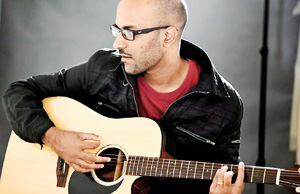Asiri finds himself with ‘Lost’
The best stories are the ones that start at the middle. Looking back, the little insignificant events suddenly make so much sense, and although things up ahead aren’t perfectly clear, you know the journey is going to be great. This is exactly how singer/songwriter Asiri’s story goes.
 Asiri Fernando released his debut solo album “Lost” on iTunes last week, along with the music video to one of the featured tracks “Don’t Give Up”. The album, the track, and the video, are not your run-of-the-mill music industry productions. They were all born out of the years of experience Asiri and his wife Cheryl have as youth workers, and all ultimately focus on one thing: agape (selfless love).
Asiri Fernando released his debut solo album “Lost” on iTunes last week, along with the music video to one of the featured tracks “Don’t Give Up”. The album, the track, and the video, are not your run-of-the-mill music industry productions. They were all born out of the years of experience Asiri and his wife Cheryl have as youth workers, and all ultimately focus on one thing: agape (selfless love).
The quiet-spoken shy-guy Master of Divinity and social worker, Asiri, is the last person you’d expect to be doing pop, punk and dubstep at a studio, at 3 a.m., three hours’ drive away from home. But this is how things pan out.
“It was extremely hard,” he says, of living in Kandy and recording an album in Colombo. But he is smiling as he says this, because he now knows that the end product was worth the sleepless nights. For Asiri, recording “Lost” is not just recording an album, it is the fulfilment of a lifetime dream, even a calling.
“I remember once, when I was around eight years old, I overheard my dad say something,” he grins. “I wasn’t supposed to hear it, but I heard him say ‘Asiri may be a good musician one day,’ and that stuck with me.” By 2013, Asiri had a substantial collection of originals composed, some of which he recorded and released on his Sound Cloud and YouTube channels. In 2013 he released “Lost”, the title track off his just-released debut album, later launching his EP.
Towards the end of 2013 Asiri was set solidly on working on a full-length album. But finding a good studio and time to actually record at wasn’t easy.
“I finally built my own recording booth at home,” he says, still almost surprised at himself. “I put a lot of money into the project and then realized I wasn’t skilled enough.” He points out though, that he wasn’t terrible at producing his own music, just not “excellent”.
Around this time, Asiri met Nishan Daniel. Ranga Dassanayake’s protégé, Nishan has been making a name for himself over the last couple of years as something of a quietly rising star in the music production arena. The singer was apprehensive at first that the producer would not be able to handle the variety of genres the album was home to, but Nishan ultimately produced, mixed, mastered and even played electric guitar on the album. Asiri now attributes the “diversity” and any musical richness in the album to his producer.
“He is God’s gift to me,” Asiri grins.
One of the other major contributors to the album is Asela Perera, who is well known in the indie/rock circles in Colombo for his gentle voice, smooth guitar playing and of course, co-founding the Melomanic sessions. Asela’s vocals are featured on “Rise Up”, a call to drop historical baggage and run for your dreams.
“Don’t Give Up On Your Love”, aptly a reggae track, talks in broader terms of doing the right thing. But the music video by Chamil Pathirana from Thaala Roopa that goes with it (the video and track were shot and recorded with young people from seven different nations) sets things strongly in perspective. Damien Fernando and Amandi Caldera play a young couple getting pulled apart by a habit of one-night-stands, at the expense of their little daughter. Many of the young people that Asiri and his wife Cheryl work with and for, come from “broken homes”, and for Asiri, this track about forgiveness and reconciliation (like many of the others on the album) is an “outpouring from [his] heart” in response to the emotional scars they carry.
Even more socially aware is “Who’s Gonna Care”, featuring seven-year-old Geyen Peiris. The track is loud, with what Asiri calls an “in-your-face” EDM sound, inspired by a child the songwriter often sees, walking to work each morning. Asiri is very serious about making music that is “not ignorant to the suffering in the world,” and this is reflected in the title of the album: “Lost”.
“It’s partly about how we get lost in our own selfishness,” Asiri explains, “and partly about how sometimes we get so lost in the world around us that we forget who we are.” This two-dimensional struggle of being “lost” for identity which gives the album its very real tension is caught beautifully in the artwork for the cover by Bhagya Gunewardena. Angels and demons painted in Renaissance-like detail make war with each other behind the face of the artist, which is half in shadow, half bathed in light. But this war can be resolved with a patient and kind love, the album seems to say.
All ten tracks on the “Lost” album released digitally on February 21 were written and composed by Asiri over the last three years, and are genuine if nothing else.
“I’m always honest, and real,” he says, “even about my faith. Music is God’s gift of grace to me, and I want to be a good steward of that gift, and use it for change.”


